Organizational Behaviour: Culture, Motivation, Teams, and Politics
VerifiedAdded on 2023/01/03
|14
|3923
|59
Report
AI Summary
This report provides an analysis of organizational behaviour, focusing on the case of Richer Sounds. It begins with an introduction to organizational behaviour, defining its importance in understanding human behaviour within organizations. The report then delves into the influence of organizational culture, politics, and power on individual and team behaviour, using Handy's Model and French and Raven's power bases to analyze Richer Sounds. The report also explores process theories of motivation, including Maslow's hierarchy of needs, McClelland's theory of needs, and Herzberg's two-factor theory, along with motivational techniques. Furthermore, the report contrasts effective and ineffective teams, highlighting the characteristics that contribute to team success and failure. Finally, the report discusses concepts and philosophies of organizational behaviour within the organizational context, providing a comprehensive overview of the subject matter.
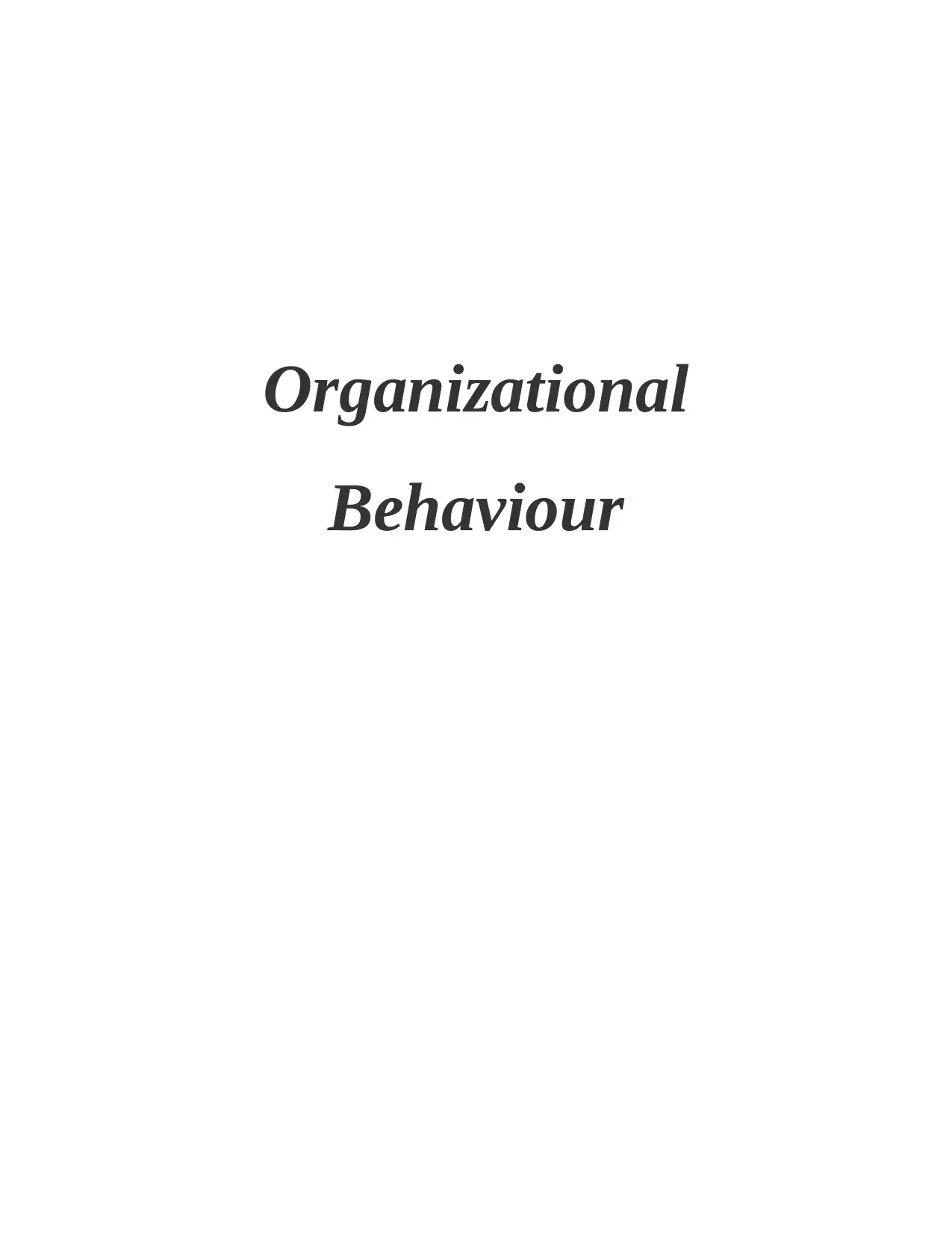
Organizational
Behaviour
Behaviour
Paraphrase This Document
Need a fresh take? Get an instant paraphrase of this document with our AI Paraphraser
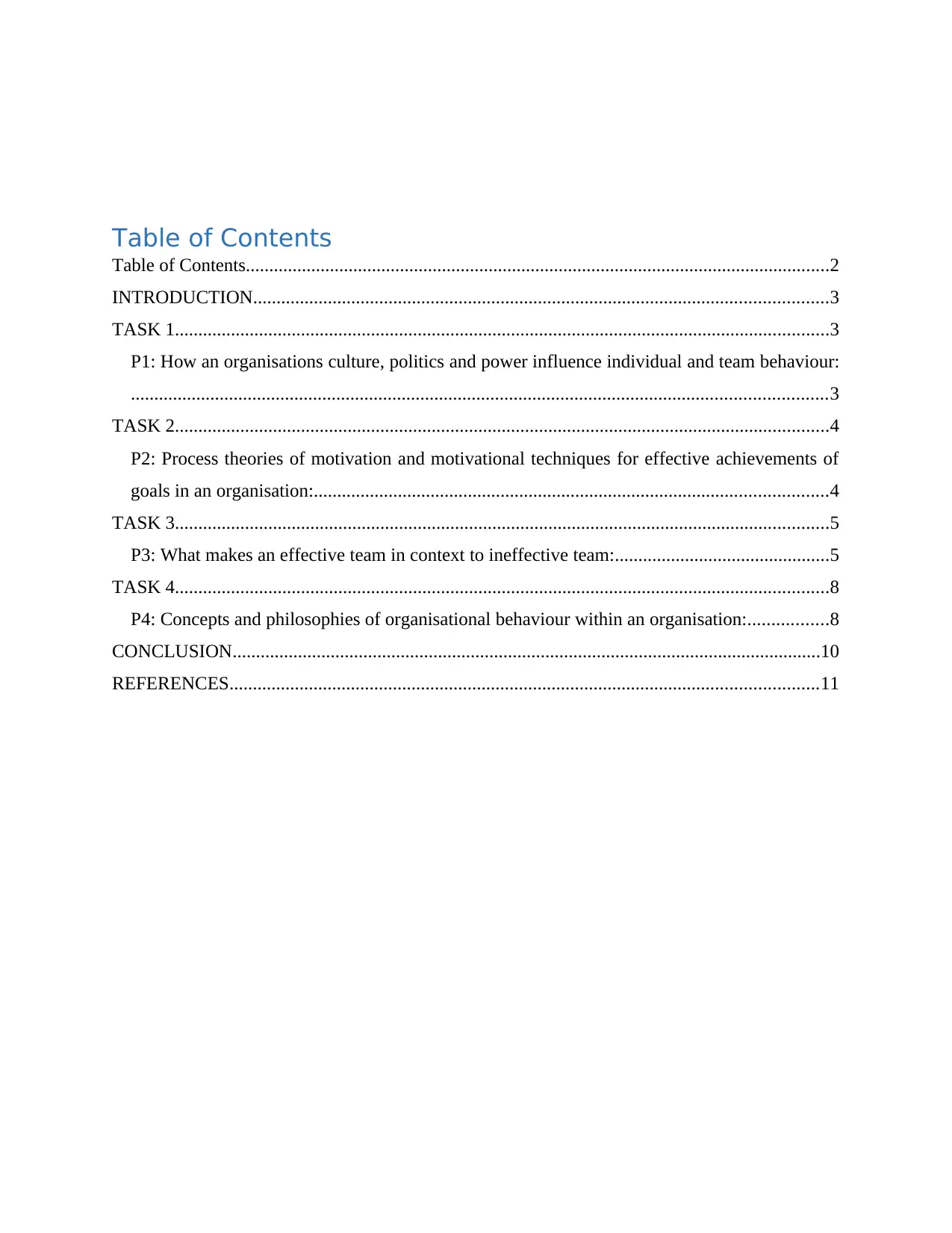
Table of Contents
Table of Contents.............................................................................................................................2
INTRODUCTION...........................................................................................................................3
TASK 1............................................................................................................................................3
P1: How an organisations culture, politics and power influence individual and team behaviour:
.....................................................................................................................................................3
TASK 2............................................................................................................................................4
P2: Process theories of motivation and motivational techniques for effective achievements of
goals in an organisation:..............................................................................................................4
TASK 3............................................................................................................................................5
P3: What makes an effective team in context to ineffective team:..............................................5
TASK 4............................................................................................................................................8
P4: Concepts and philosophies of organisational behaviour within an organisation:.................8
CONCLUSION..............................................................................................................................10
REFERENCES..............................................................................................................................11
Table of Contents.............................................................................................................................2
INTRODUCTION...........................................................................................................................3
TASK 1............................................................................................................................................3
P1: How an organisations culture, politics and power influence individual and team behaviour:
.....................................................................................................................................................3
TASK 2............................................................................................................................................4
P2: Process theories of motivation and motivational techniques for effective achievements of
goals in an organisation:..............................................................................................................4
TASK 3............................................................................................................................................5
P3: What makes an effective team in context to ineffective team:..............................................5
TASK 4............................................................................................................................................8
P4: Concepts and philosophies of organisational behaviour within an organisation:.................8
CONCLUSION..............................................................................................................................10
REFERENCES..............................................................................................................................11
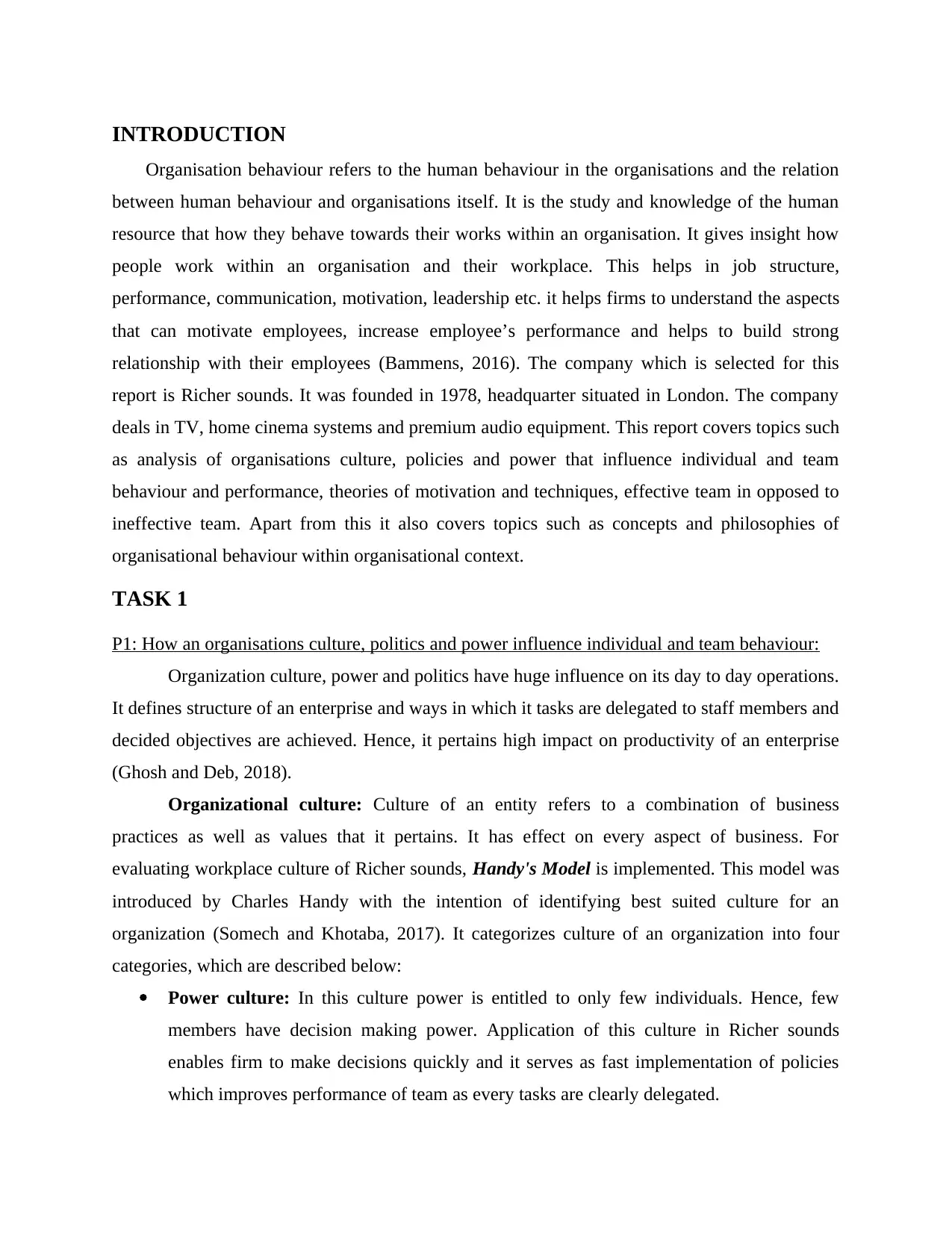
INTRODUCTION
Organisation behaviour refers to the human behaviour in the organisations and the relation
between human behaviour and organisations itself. It is the study and knowledge of the human
resource that how they behave towards their works within an organisation. It gives insight how
people work within an organisation and their workplace. This helps in job structure,
performance, communication, motivation, leadership etc. it helps firms to understand the aspects
that can motivate employees, increase employee’s performance and helps to build strong
relationship with their employees (Bammens, 2016). The company which is selected for this
report is Richer sounds. It was founded in 1978, headquarter situated in London. The company
deals in TV, home cinema systems and premium audio equipment. This report covers topics such
as analysis of organisations culture, policies and power that influence individual and team
behaviour and performance, theories of motivation and techniques, effective team in opposed to
ineffective team. Apart from this it also covers topics such as concepts and philosophies of
organisational behaviour within organisational context.
TASK 1
P1: How an organisations culture, politics and power influence individual and team behaviour:
Organization culture, power and politics have huge influence on its day to day operations.
It defines structure of an enterprise and ways in which it tasks are delegated to staff members and
decided objectives are achieved. Hence, it pertains high impact on productivity of an enterprise
(Ghosh and Deb, 2018).
Organizational culture: Culture of an entity refers to a combination of business
practices as well as values that it pertains. It has effect on every aspect of business. For
evaluating workplace culture of Richer sounds, Handy's Model is implemented. This model was
introduced by Charles Handy with the intention of identifying best suited culture for an
organization (Somech and Khotaba, 2017). It categorizes culture of an organization into four
categories, which are described below:
Power culture: In this culture power is entitled to only few individuals. Hence, few
members have decision making power. Application of this culture in Richer sounds
enables firm to make decisions quickly and it serves as fast implementation of policies
which improves performance of team as every tasks are clearly delegated.
Organisation behaviour refers to the human behaviour in the organisations and the relation
between human behaviour and organisations itself. It is the study and knowledge of the human
resource that how they behave towards their works within an organisation. It gives insight how
people work within an organisation and their workplace. This helps in job structure,
performance, communication, motivation, leadership etc. it helps firms to understand the aspects
that can motivate employees, increase employee’s performance and helps to build strong
relationship with their employees (Bammens, 2016). The company which is selected for this
report is Richer sounds. It was founded in 1978, headquarter situated in London. The company
deals in TV, home cinema systems and premium audio equipment. This report covers topics such
as analysis of organisations culture, policies and power that influence individual and team
behaviour and performance, theories of motivation and techniques, effective team in opposed to
ineffective team. Apart from this it also covers topics such as concepts and philosophies of
organisational behaviour within organisational context.
TASK 1
P1: How an organisations culture, politics and power influence individual and team behaviour:
Organization culture, power and politics have huge influence on its day to day operations.
It defines structure of an enterprise and ways in which it tasks are delegated to staff members and
decided objectives are achieved. Hence, it pertains high impact on productivity of an enterprise
(Ghosh and Deb, 2018).
Organizational culture: Culture of an entity refers to a combination of business
practices as well as values that it pertains. It has effect on every aspect of business. For
evaluating workplace culture of Richer sounds, Handy's Model is implemented. This model was
introduced by Charles Handy with the intention of identifying best suited culture for an
organization (Somech and Khotaba, 2017). It categorizes culture of an organization into four
categories, which are described below:
Power culture: In this culture power is entitled to only few individuals. Hence, few
members have decision making power. Application of this culture in Richer sounds
enables firm to make decisions quickly and it serves as fast implementation of policies
which improves performance of team as every tasks are clearly delegated.
⊘ This is a preview!⊘
Do you want full access?
Subscribe today to unlock all pages.

Trusted by 1+ million students worldwide
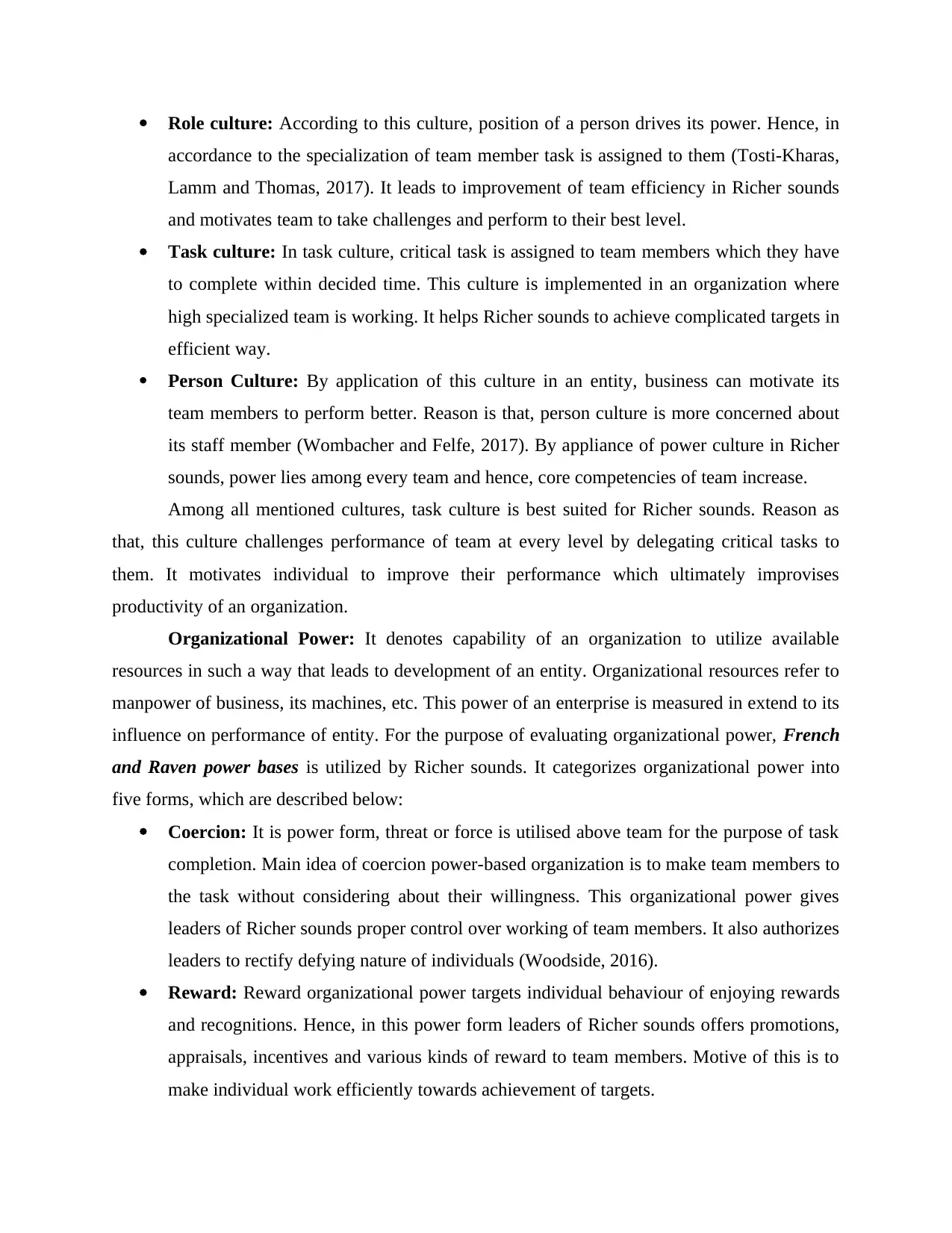
Role culture: According to this culture, position of a person drives its power. Hence, in
accordance to the specialization of team member task is assigned to them (Tosti-Kharas,
Lamm and Thomas, 2017). It leads to improvement of team efficiency in Richer sounds
and motivates team to take challenges and perform to their best level.
Task culture: In task culture, critical task is assigned to team members which they have
to complete within decided time. This culture is implemented in an organization where
high specialized team is working. It helps Richer sounds to achieve complicated targets in
efficient way.
Person Culture: By application of this culture in an entity, business can motivate its
team members to perform better. Reason is that, person culture is more concerned about
its staff member (Wombacher and Felfe, 2017). By appliance of power culture in Richer
sounds, power lies among every team and hence, core competencies of team increase.
Among all mentioned cultures, task culture is best suited for Richer sounds. Reason as
that, this culture challenges performance of team at every level by delegating critical tasks to
them. It motivates individual to improve their performance which ultimately improvises
productivity of an organization.
Organizational Power: It denotes capability of an organization to utilize available
resources in such a way that leads to development of an entity. Organizational resources refer to
manpower of business, its machines, etc. This power of an enterprise is measured in extend to its
influence on performance of entity. For the purpose of evaluating organizational power, French
and Raven power bases is utilized by Richer sounds. It categorizes organizational power into
five forms, which are described below:
Coercion: It is power form, threat or force is utilised above team for the purpose of task
completion. Main idea of coercion power-based organization is to make team members to
the task without considering about their willingness. This organizational power gives
leaders of Richer sounds proper control over working of team members. It also authorizes
leaders to rectify defying nature of individuals (Woodside, 2016).
Reward: Reward organizational power targets individual behaviour of enjoying rewards
and recognitions. Hence, in this power form leaders of Richer sounds offers promotions,
appraisals, incentives and various kinds of reward to team members. Motive of this is to
make individual work efficiently towards achievement of targets.
accordance to the specialization of team member task is assigned to them (Tosti-Kharas,
Lamm and Thomas, 2017). It leads to improvement of team efficiency in Richer sounds
and motivates team to take challenges and perform to their best level.
Task culture: In task culture, critical task is assigned to team members which they have
to complete within decided time. This culture is implemented in an organization where
high specialized team is working. It helps Richer sounds to achieve complicated targets in
efficient way.
Person Culture: By application of this culture in an entity, business can motivate its
team members to perform better. Reason is that, person culture is more concerned about
its staff member (Wombacher and Felfe, 2017). By appliance of power culture in Richer
sounds, power lies among every team and hence, core competencies of team increase.
Among all mentioned cultures, task culture is best suited for Richer sounds. Reason as
that, this culture challenges performance of team at every level by delegating critical tasks to
them. It motivates individual to improve their performance which ultimately improvises
productivity of an organization.
Organizational Power: It denotes capability of an organization to utilize available
resources in such a way that leads to development of an entity. Organizational resources refer to
manpower of business, its machines, etc. This power of an enterprise is measured in extend to its
influence on performance of entity. For the purpose of evaluating organizational power, French
and Raven power bases is utilized by Richer sounds. It categorizes organizational power into
five forms, which are described below:
Coercion: It is power form, threat or force is utilised above team for the purpose of task
completion. Main idea of coercion power-based organization is to make team members to
the task without considering about their willingness. This organizational power gives
leaders of Richer sounds proper control over working of team members. It also authorizes
leaders to rectify defying nature of individuals (Woodside, 2016).
Reward: Reward organizational power targets individual behaviour of enjoying rewards
and recognitions. Hence, in this power form leaders of Richer sounds offers promotions,
appraisals, incentives and various kinds of reward to team members. Motive of this is to
make individual work efficiently towards achievement of targets.
Paraphrase This Document
Need a fresh take? Get an instant paraphrase of this document with our AI Paraphraser
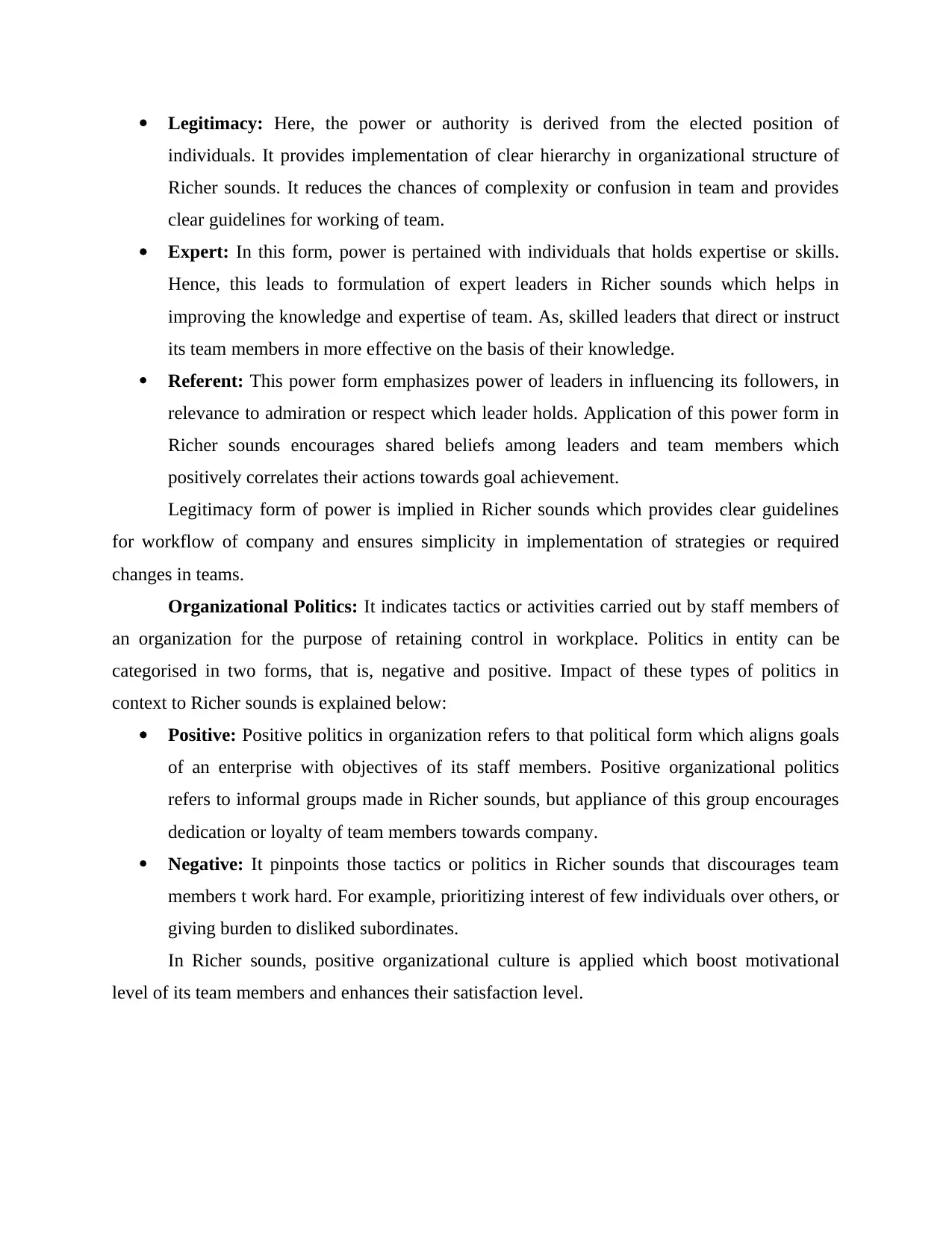
Legitimacy: Here, the power or authority is derived from the elected position of
individuals. It provides implementation of clear hierarchy in organizational structure of
Richer sounds. It reduces the chances of complexity or confusion in team and provides
clear guidelines for working of team.
Expert: In this form, power is pertained with individuals that holds expertise or skills.
Hence, this leads to formulation of expert leaders in Richer sounds which helps in
improving the knowledge and expertise of team. As, skilled leaders that direct or instruct
its team members in more effective on the basis of their knowledge.
Referent: This power form emphasizes power of leaders in influencing its followers, in
relevance to admiration or respect which leader holds. Application of this power form in
Richer sounds encourages shared beliefs among leaders and team members which
positively correlates their actions towards goal achievement.
Legitimacy form of power is implied in Richer sounds which provides clear guidelines
for workflow of company and ensures simplicity in implementation of strategies or required
changes in teams.
Organizational Politics: It indicates tactics or activities carried out by staff members of
an organization for the purpose of retaining control in workplace. Politics in entity can be
categorised in two forms, that is, negative and positive. Impact of these types of politics in
context to Richer sounds is explained below:
Positive: Positive politics in organization refers to that political form which aligns goals
of an enterprise with objectives of its staff members. Positive organizational politics
refers to informal groups made in Richer sounds, but appliance of this group encourages
dedication or loyalty of team members towards company.
Negative: It pinpoints those tactics or politics in Richer sounds that discourages team
members t work hard. For example, prioritizing interest of few individuals over others, or
giving burden to disliked subordinates.
In Richer sounds, positive organizational culture is applied which boost motivational
level of its team members and enhances their satisfaction level.
individuals. It provides implementation of clear hierarchy in organizational structure of
Richer sounds. It reduces the chances of complexity or confusion in team and provides
clear guidelines for working of team.
Expert: In this form, power is pertained with individuals that holds expertise or skills.
Hence, this leads to formulation of expert leaders in Richer sounds which helps in
improving the knowledge and expertise of team. As, skilled leaders that direct or instruct
its team members in more effective on the basis of their knowledge.
Referent: This power form emphasizes power of leaders in influencing its followers, in
relevance to admiration or respect which leader holds. Application of this power form in
Richer sounds encourages shared beliefs among leaders and team members which
positively correlates their actions towards goal achievement.
Legitimacy form of power is implied in Richer sounds which provides clear guidelines
for workflow of company and ensures simplicity in implementation of strategies or required
changes in teams.
Organizational Politics: It indicates tactics or activities carried out by staff members of
an organization for the purpose of retaining control in workplace. Politics in entity can be
categorised in two forms, that is, negative and positive. Impact of these types of politics in
context to Richer sounds is explained below:
Positive: Positive politics in organization refers to that political form which aligns goals
of an enterprise with objectives of its staff members. Positive organizational politics
refers to informal groups made in Richer sounds, but appliance of this group encourages
dedication or loyalty of team members towards company.
Negative: It pinpoints those tactics or politics in Richer sounds that discourages team
members t work hard. For example, prioritizing interest of few individuals over others, or
giving burden to disliked subordinates.
In Richer sounds, positive organizational culture is applied which boost motivational
level of its team members and enhances their satisfaction level.
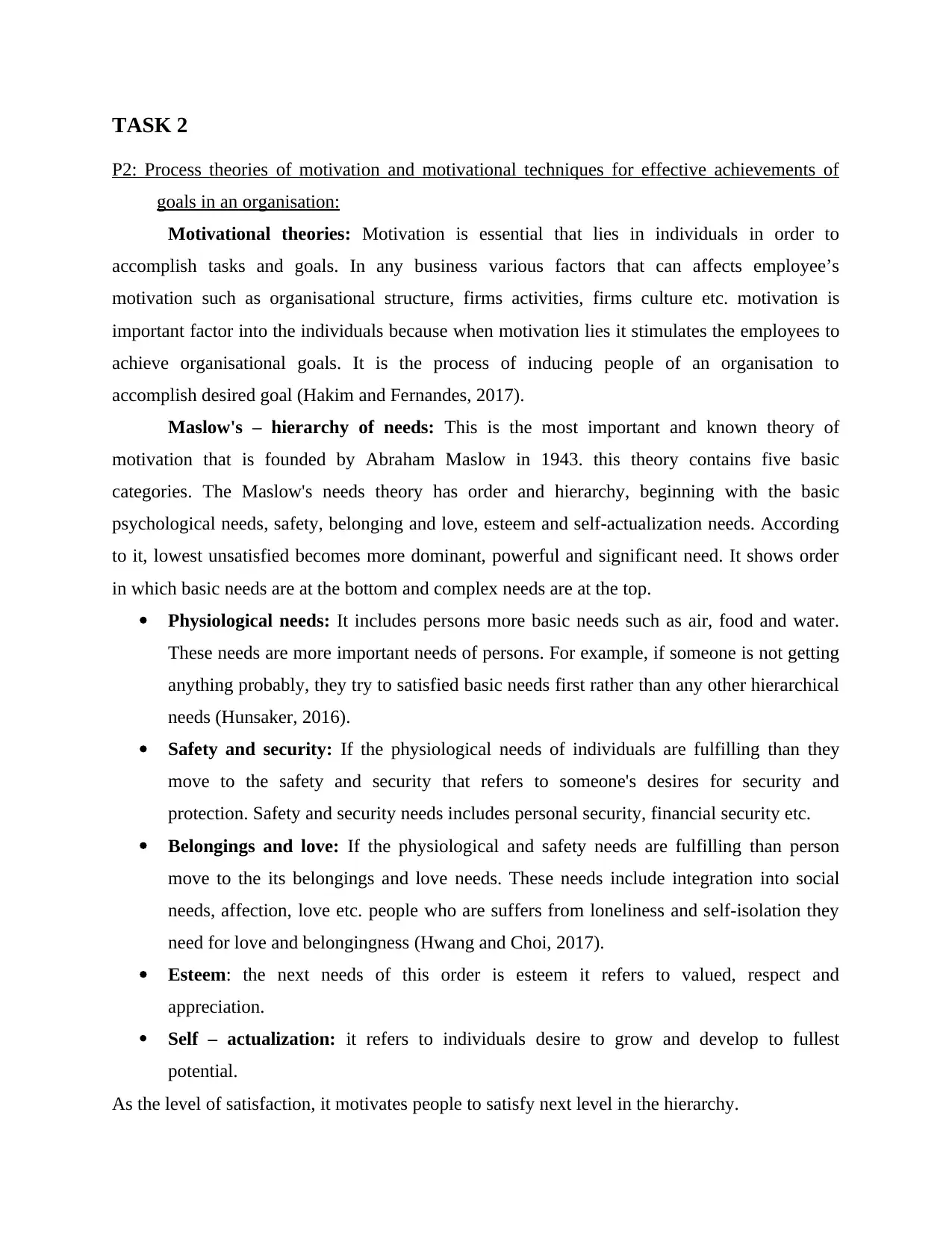
TASK 2
P2: Process theories of motivation and motivational techniques for effective achievements of
goals in an organisation:
Motivational theories: Motivation is essential that lies in individuals in order to
accomplish tasks and goals. In any business various factors that can affects employee’s
motivation such as organisational structure, firms activities, firms culture etc. motivation is
important factor into the individuals because when motivation lies it stimulates the employees to
achieve organisational goals. It is the process of inducing people of an organisation to
accomplish desired goal (Hakim and Fernandes, 2017).
Maslow's – hierarchy of needs: This is the most important and known theory of
motivation that is founded by Abraham Maslow in 1943. this theory contains five basic
categories. The Maslow's needs theory has order and hierarchy, beginning with the basic
psychological needs, safety, belonging and love, esteem and self-actualization needs. According
to it, lowest unsatisfied becomes more dominant, powerful and significant need. It shows order
in which basic needs are at the bottom and complex needs are at the top.
Physiological needs: It includes persons more basic needs such as air, food and water.
These needs are more important needs of persons. For example, if someone is not getting
anything probably, they try to satisfied basic needs first rather than any other hierarchical
needs (Hunsaker, 2016).
Safety and security: If the physiological needs of individuals are fulfilling than they
move to the safety and security that refers to someone's desires for security and
protection. Safety and security needs includes personal security, financial security etc.
Belongings and love: If the physiological and safety needs are fulfilling than person
move to the its belongings and love needs. These needs include integration into social
needs, affection, love etc. people who are suffers from loneliness and self-isolation they
need for love and belongingness (Hwang and Choi, 2017).
Esteem: the next needs of this order is esteem it refers to valued, respect and
appreciation.
Self – actualization: it refers to individuals desire to grow and develop to fullest
potential.
As the level of satisfaction, it motivates people to satisfy next level in the hierarchy.
P2: Process theories of motivation and motivational techniques for effective achievements of
goals in an organisation:
Motivational theories: Motivation is essential that lies in individuals in order to
accomplish tasks and goals. In any business various factors that can affects employee’s
motivation such as organisational structure, firms activities, firms culture etc. motivation is
important factor into the individuals because when motivation lies it stimulates the employees to
achieve organisational goals. It is the process of inducing people of an organisation to
accomplish desired goal (Hakim and Fernandes, 2017).
Maslow's – hierarchy of needs: This is the most important and known theory of
motivation that is founded by Abraham Maslow in 1943. this theory contains five basic
categories. The Maslow's needs theory has order and hierarchy, beginning with the basic
psychological needs, safety, belonging and love, esteem and self-actualization needs. According
to it, lowest unsatisfied becomes more dominant, powerful and significant need. It shows order
in which basic needs are at the bottom and complex needs are at the top.
Physiological needs: It includes persons more basic needs such as air, food and water.
These needs are more important needs of persons. For example, if someone is not getting
anything probably, they try to satisfied basic needs first rather than any other hierarchical
needs (Hunsaker, 2016).
Safety and security: If the physiological needs of individuals are fulfilling than they
move to the safety and security that refers to someone's desires for security and
protection. Safety and security needs includes personal security, financial security etc.
Belongings and love: If the physiological and safety needs are fulfilling than person
move to the its belongings and love needs. These needs include integration into social
needs, affection, love etc. people who are suffers from loneliness and self-isolation they
need for love and belongingness (Hwang and Choi, 2017).
Esteem: the next needs of this order is esteem it refers to valued, respect and
appreciation.
Self – actualization: it refers to individuals desire to grow and develop to fullest
potential.
As the level of satisfaction, it motivates people to satisfy next level in the hierarchy.
⊘ This is a preview!⊘
Do you want full access?
Subscribe today to unlock all pages.

Trusted by 1+ million students worldwide
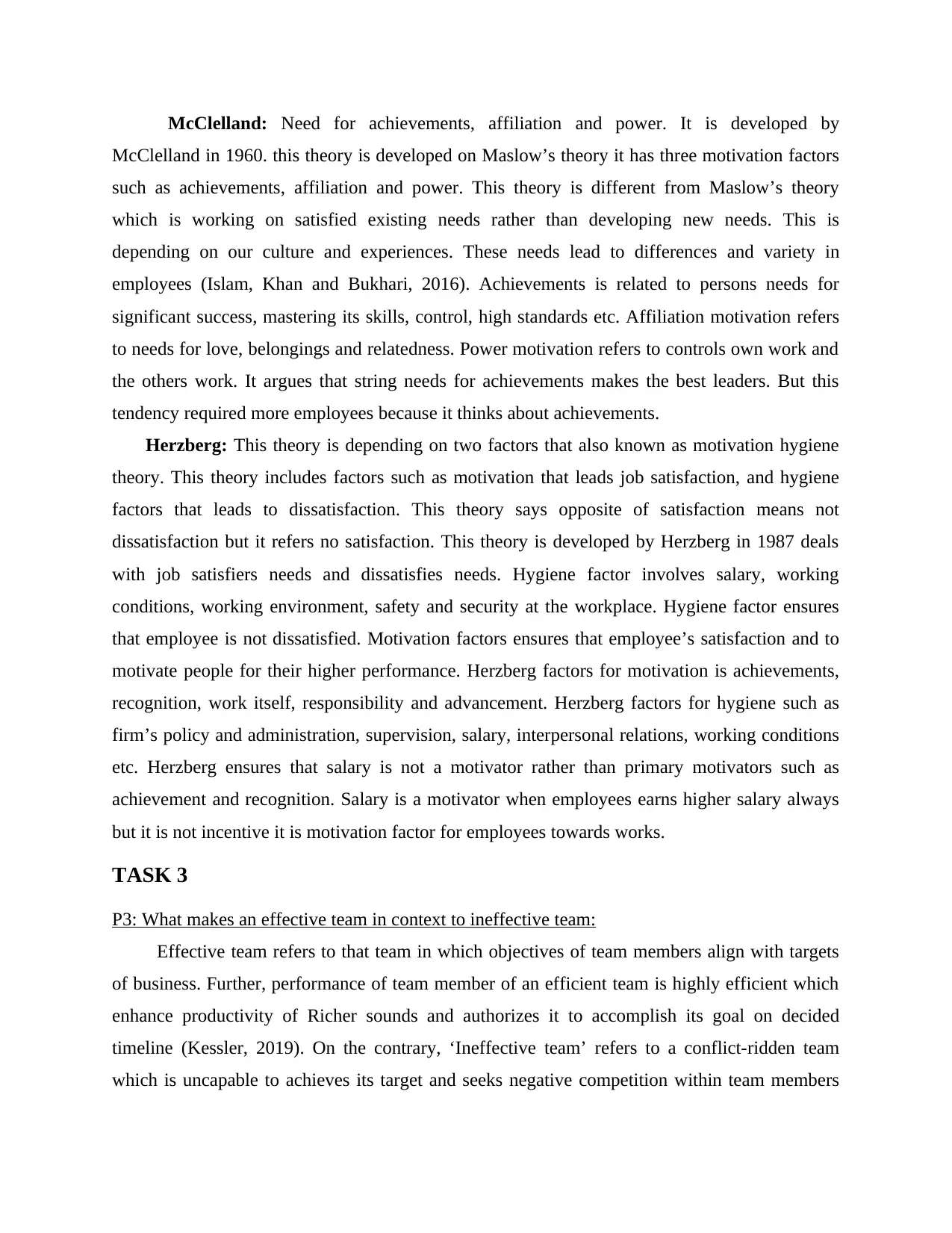
McClelland: Need for achievements, affiliation and power. It is developed by
McClelland in 1960. this theory is developed on Maslow’s theory it has three motivation factors
such as achievements, affiliation and power. This theory is different from Maslow’s theory
which is working on satisfied existing needs rather than developing new needs. This is
depending on our culture and experiences. These needs lead to differences and variety in
employees (Islam, Khan and Bukhari, 2016). Achievements is related to persons needs for
significant success, mastering its skills, control, high standards etc. Affiliation motivation refers
to needs for love, belongings and relatedness. Power motivation refers to controls own work and
the others work. It argues that string needs for achievements makes the best leaders. But this
tendency required more employees because it thinks about achievements.
Herzberg: This theory is depending on two factors that also known as motivation hygiene
theory. This theory includes factors such as motivation that leads job satisfaction, and hygiene
factors that leads to dissatisfaction. This theory says opposite of satisfaction means not
dissatisfaction but it refers no satisfaction. This theory is developed by Herzberg in 1987 deals
with job satisfiers needs and dissatisfies needs. Hygiene factor involves salary, working
conditions, working environment, safety and security at the workplace. Hygiene factor ensures
that employee is not dissatisfied. Motivation factors ensures that employee’s satisfaction and to
motivate people for their higher performance. Herzberg factors for motivation is achievements,
recognition, work itself, responsibility and advancement. Herzberg factors for hygiene such as
firm’s policy and administration, supervision, salary, interpersonal relations, working conditions
etc. Herzberg ensures that salary is not a motivator rather than primary motivators such as
achievement and recognition. Salary is a motivator when employees earns higher salary always
but it is not incentive it is motivation factor for employees towards works.
TASK 3
P3: What makes an effective team in context to ineffective team:
Effective team refers to that team in which objectives of team members align with targets
of business. Further, performance of team member of an efficient team is highly efficient which
enhance productivity of Richer sounds and authorizes it to accomplish its goal on decided
timeline (Kessler, 2019). On the contrary, ‘Ineffective team’ refers to a conflict-ridden team
which is uncapable to achieves its target and seeks negative competition within team members
McClelland in 1960. this theory is developed on Maslow’s theory it has three motivation factors
such as achievements, affiliation and power. This theory is different from Maslow’s theory
which is working on satisfied existing needs rather than developing new needs. This is
depending on our culture and experiences. These needs lead to differences and variety in
employees (Islam, Khan and Bukhari, 2016). Achievements is related to persons needs for
significant success, mastering its skills, control, high standards etc. Affiliation motivation refers
to needs for love, belongings and relatedness. Power motivation refers to controls own work and
the others work. It argues that string needs for achievements makes the best leaders. But this
tendency required more employees because it thinks about achievements.
Herzberg: This theory is depending on two factors that also known as motivation hygiene
theory. This theory includes factors such as motivation that leads job satisfaction, and hygiene
factors that leads to dissatisfaction. This theory says opposite of satisfaction means not
dissatisfaction but it refers no satisfaction. This theory is developed by Herzberg in 1987 deals
with job satisfiers needs and dissatisfies needs. Hygiene factor involves salary, working
conditions, working environment, safety and security at the workplace. Hygiene factor ensures
that employee is not dissatisfied. Motivation factors ensures that employee’s satisfaction and to
motivate people for their higher performance. Herzberg factors for motivation is achievements,
recognition, work itself, responsibility and advancement. Herzberg factors for hygiene such as
firm’s policy and administration, supervision, salary, interpersonal relations, working conditions
etc. Herzberg ensures that salary is not a motivator rather than primary motivators such as
achievement and recognition. Salary is a motivator when employees earns higher salary always
but it is not incentive it is motivation factor for employees towards works.
TASK 3
P3: What makes an effective team in context to ineffective team:
Effective team refers to that team in which objectives of team members align with targets
of business. Further, performance of team member of an efficient team is highly efficient which
enhance productivity of Richer sounds and authorizes it to accomplish its goal on decided
timeline (Kessler, 2019). On the contrary, ‘Ineffective team’ refers to a conflict-ridden team
which is uncapable to achieves its target and seeks negative competition within team members
Paraphrase This Document
Need a fresh take? Get an instant paraphrase of this document with our AI Paraphraser
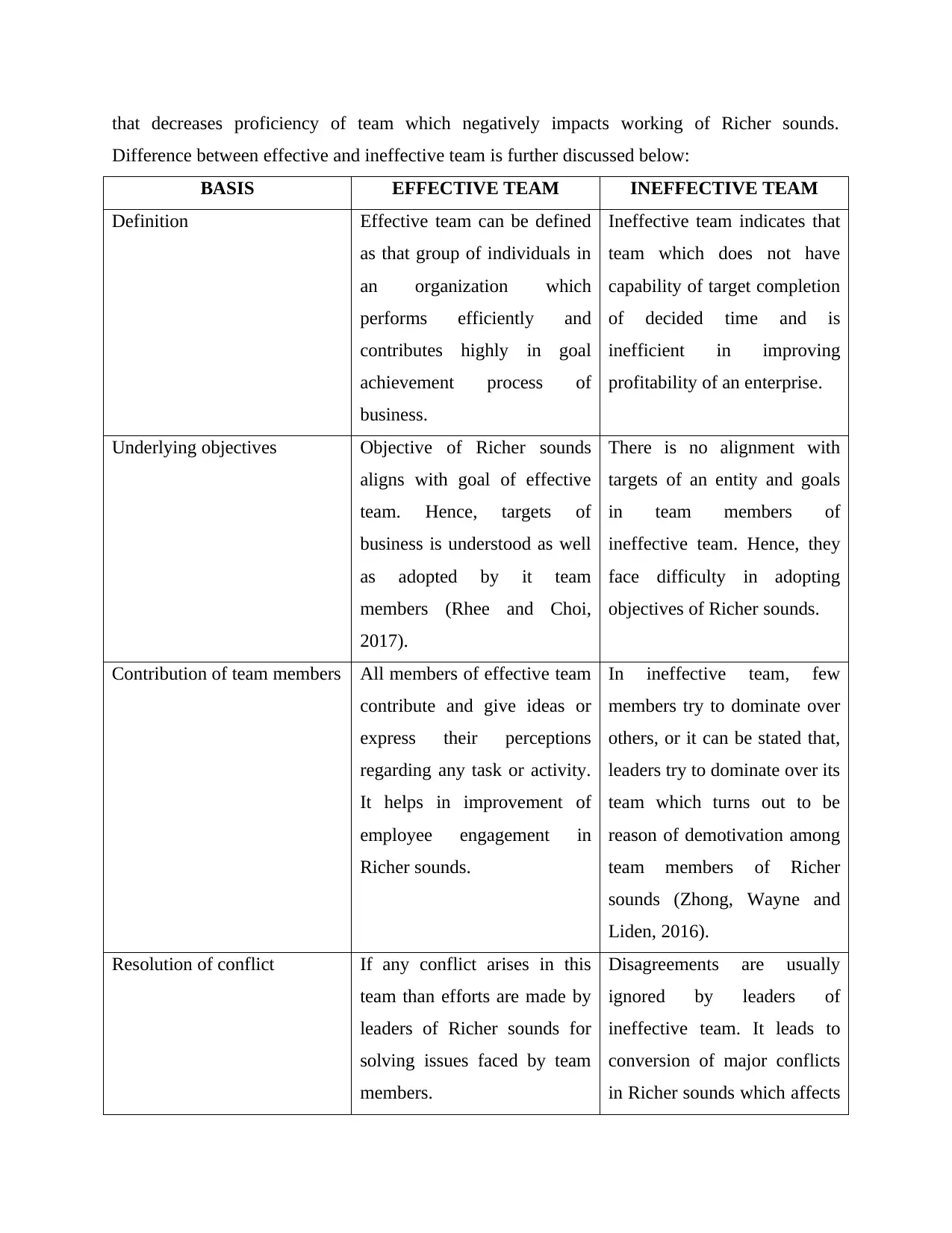
that decreases proficiency of team which negatively impacts working of Richer sounds.
Difference between effective and ineffective team is further discussed below:
BASIS EFFECTIVE TEAM INEFFECTIVE TEAM
Definition Effective team can be defined
as that group of individuals in
an organization which
performs efficiently and
contributes highly in goal
achievement process of
business.
Ineffective team indicates that
team which does not have
capability of target completion
of decided time and is
inefficient in improving
profitability of an enterprise.
Underlying objectives Objective of Richer sounds
aligns with goal of effective
team. Hence, targets of
business is understood as well
as adopted by it team
members (Rhee and Choi,
2017).
There is no alignment with
targets of an entity and goals
in team members of
ineffective team. Hence, they
face difficulty in adopting
objectives of Richer sounds.
Contribution of team members All members of effective team
contribute and give ideas or
express their perceptions
regarding any task or activity.
It helps in improvement of
employee engagement in
Richer sounds.
In ineffective team, few
members try to dominate over
others, or it can be stated that,
leaders try to dominate over its
team which turns out to be
reason of demotivation among
team members of Richer
sounds (Zhong, Wayne and
Liden, 2016).
Resolution of conflict If any conflict arises in this
team than efforts are made by
leaders of Richer sounds for
solving issues faced by team
members.
Disagreements are usually
ignored by leaders of
ineffective team. It leads to
conversion of major conflicts
in Richer sounds which affects
Difference between effective and ineffective team is further discussed below:
BASIS EFFECTIVE TEAM INEFFECTIVE TEAM
Definition Effective team can be defined
as that group of individuals in
an organization which
performs efficiently and
contributes highly in goal
achievement process of
business.
Ineffective team indicates that
team which does not have
capability of target completion
of decided time and is
inefficient in improving
profitability of an enterprise.
Underlying objectives Objective of Richer sounds
aligns with goal of effective
team. Hence, targets of
business is understood as well
as adopted by it team
members (Rhee and Choi,
2017).
There is no alignment with
targets of an entity and goals
in team members of
ineffective team. Hence, they
face difficulty in adopting
objectives of Richer sounds.
Contribution of team members All members of effective team
contribute and give ideas or
express their perceptions
regarding any task or activity.
It helps in improvement of
employee engagement in
Richer sounds.
In ineffective team, few
members try to dominate over
others, or it can be stated that,
leaders try to dominate over its
team which turns out to be
reason of demotivation among
team members of Richer
sounds (Zhong, Wayne and
Liden, 2016).
Resolution of conflict If any conflict arises in this
team than efforts are made by
leaders of Richer sounds for
solving issues faced by team
members.
Disagreements are usually
ignored by leaders of
ineffective team. It leads to
conversion of major conflicts
in Richer sounds which affects
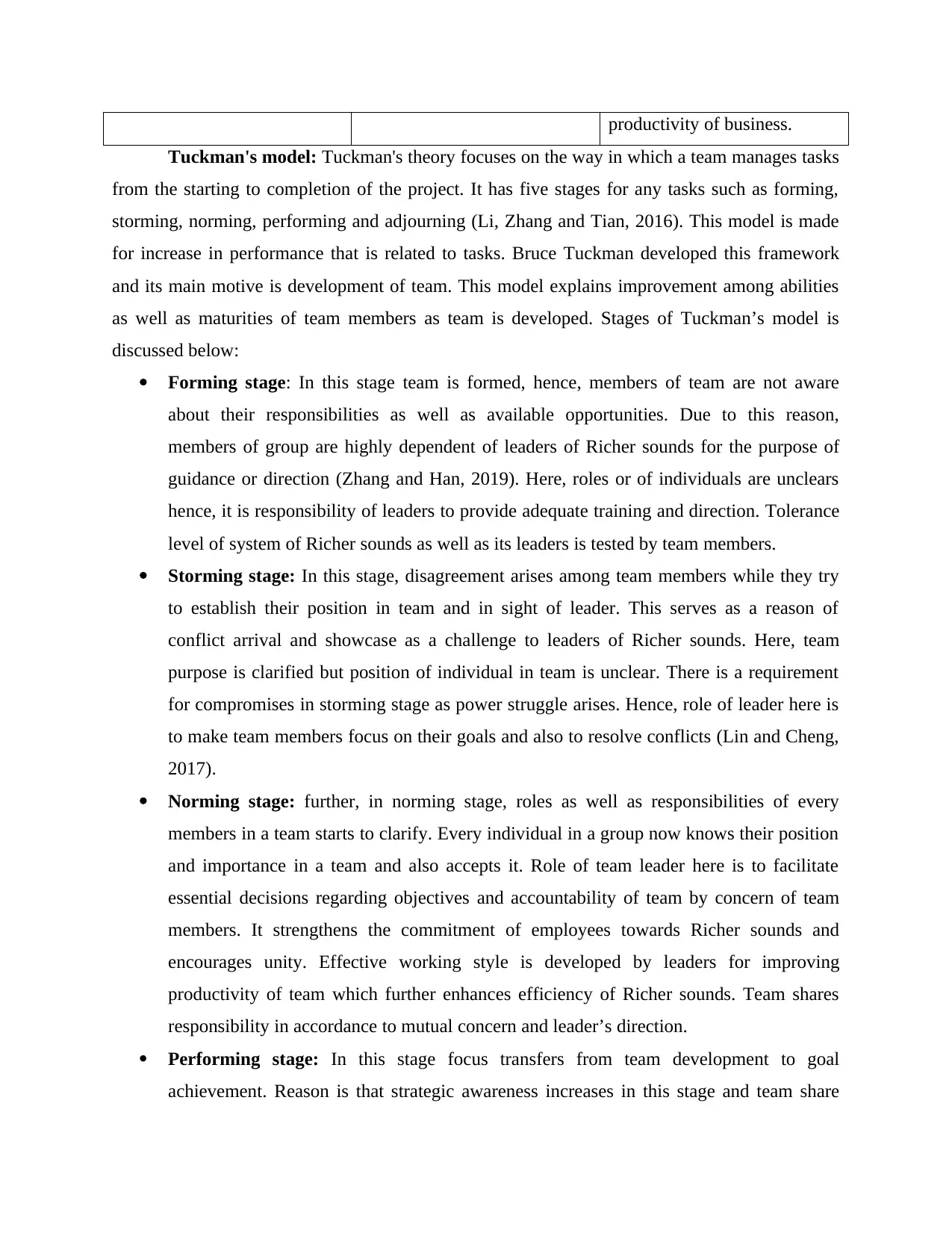
productivity of business.
Tuckman's model: Tuckman's theory focuses on the way in which a team manages tasks
from the starting to completion of the project. It has five stages for any tasks such as forming,
storming, norming, performing and adjourning (Li, Zhang and Tian, 2016). This model is made
for increase in performance that is related to tasks. Bruce Tuckman developed this framework
and its main motive is development of team. This model explains improvement among abilities
as well as maturities of team members as team is developed. Stages of Tuckman’s model is
discussed below:
Forming stage: In this stage team is formed, hence, members of team are not aware
about their responsibilities as well as available opportunities. Due to this reason,
members of group are highly dependent of leaders of Richer sounds for the purpose of
guidance or direction (Zhang and Han, 2019). Here, roles or of individuals are unclears
hence, it is responsibility of leaders to provide adequate training and direction. Tolerance
level of system of Richer sounds as well as its leaders is tested by team members.
Storming stage: In this stage, disagreement arises among team members while they try
to establish their position in team and in sight of leader. This serves as a reason of
conflict arrival and showcase as a challenge to leaders of Richer sounds. Here, team
purpose is clarified but position of individual in team is unclear. There is a requirement
for compromises in storming stage as power struggle arises. Hence, role of leader here is
to make team members focus on their goals and also to resolve conflicts (Lin and Cheng,
2017).
Norming stage: further, in norming stage, roles as well as responsibilities of every
members in a team starts to clarify. Every individual in a group now knows their position
and importance in a team and also accepts it. Role of team leader here is to facilitate
essential decisions regarding objectives and accountability of team by concern of team
members. It strengthens the commitment of employees towards Richer sounds and
encourages unity. Effective working style is developed by leaders for improving
productivity of team which further enhances efficiency of Richer sounds. Team shares
responsibility in accordance to mutual concern and leader’s direction.
Performing stage: In this stage focus transfers from team development to goal
achievement. Reason is that strategic awareness increases in this stage and team share
Tuckman's model: Tuckman's theory focuses on the way in which a team manages tasks
from the starting to completion of the project. It has five stages for any tasks such as forming,
storming, norming, performing and adjourning (Li, Zhang and Tian, 2016). This model is made
for increase in performance that is related to tasks. Bruce Tuckman developed this framework
and its main motive is development of team. This model explains improvement among abilities
as well as maturities of team members as team is developed. Stages of Tuckman’s model is
discussed below:
Forming stage: In this stage team is formed, hence, members of team are not aware
about their responsibilities as well as available opportunities. Due to this reason,
members of group are highly dependent of leaders of Richer sounds for the purpose of
guidance or direction (Zhang and Han, 2019). Here, roles or of individuals are unclears
hence, it is responsibility of leaders to provide adequate training and direction. Tolerance
level of system of Richer sounds as well as its leaders is tested by team members.
Storming stage: In this stage, disagreement arises among team members while they try
to establish their position in team and in sight of leader. This serves as a reason of
conflict arrival and showcase as a challenge to leaders of Richer sounds. Here, team
purpose is clarified but position of individual in team is unclear. There is a requirement
for compromises in storming stage as power struggle arises. Hence, role of leader here is
to make team members focus on their goals and also to resolve conflicts (Lin and Cheng,
2017).
Norming stage: further, in norming stage, roles as well as responsibilities of every
members in a team starts to clarify. Every individual in a group now knows their position
and importance in a team and also accepts it. Role of team leader here is to facilitate
essential decisions regarding objectives and accountability of team by concern of team
members. It strengthens the commitment of employees towards Richer sounds and
encourages unity. Effective working style is developed by leaders for improving
productivity of team which further enhances efficiency of Richer sounds. Team shares
responsibility in accordance to mutual concern and leader’s direction.
Performing stage: In this stage focus transfers from team development to goal
achievement. Reason is that strategic awareness increases in this stage and team share
⊘ This is a preview!⊘
Do you want full access?
Subscribe today to unlock all pages.

Trusted by 1+ million students worldwide
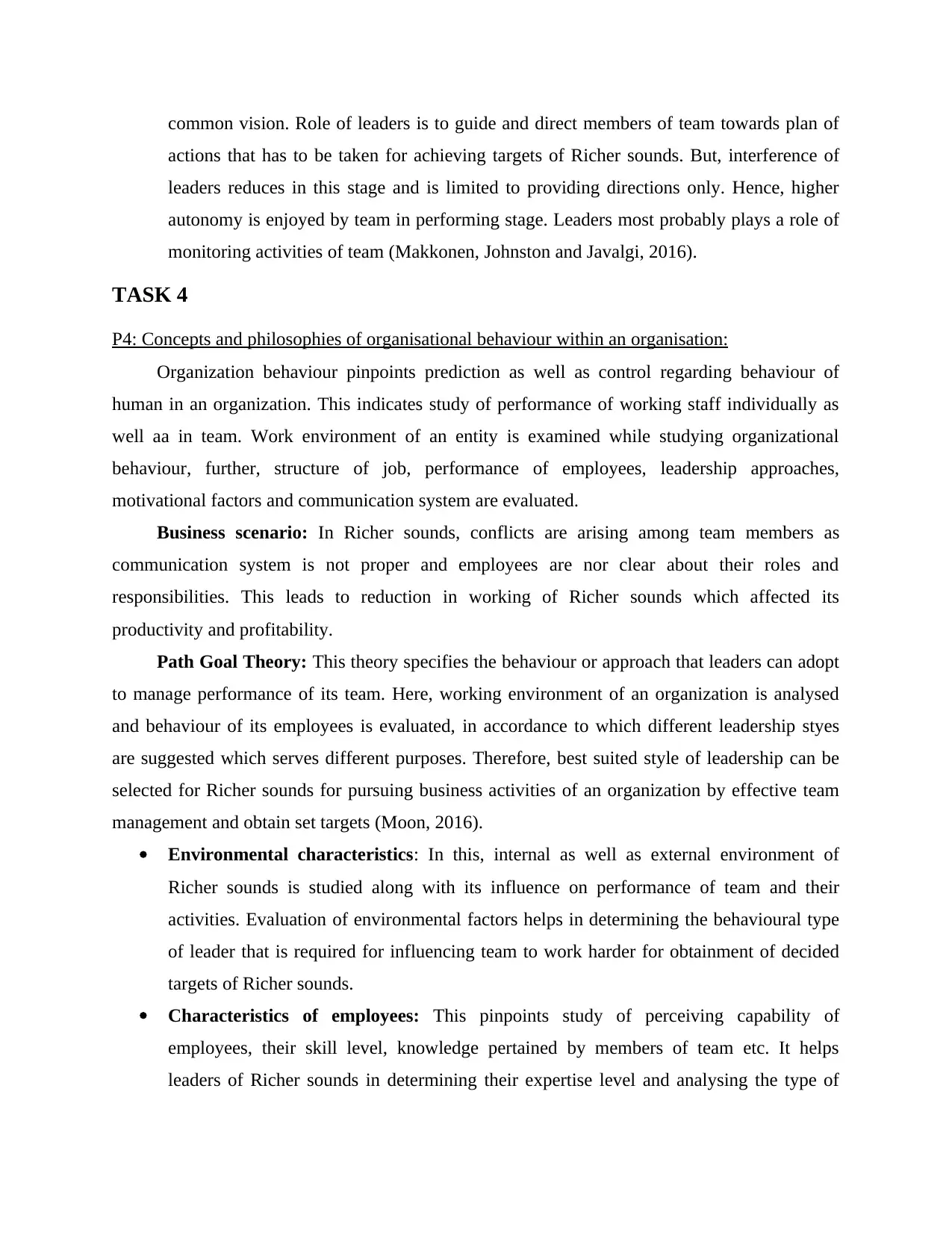
common vision. Role of leaders is to guide and direct members of team towards plan of
actions that has to be taken for achieving targets of Richer sounds. But, interference of
leaders reduces in this stage and is limited to providing directions only. Hence, higher
autonomy is enjoyed by team in performing stage. Leaders most probably plays a role of
monitoring activities of team (Makkonen, Johnston and Javalgi, 2016).
TASK 4
P4: Concepts and philosophies of organisational behaviour within an organisation:
Organization behaviour pinpoints prediction as well as control regarding behaviour of
human in an organization. This indicates study of performance of working staff individually as
well aa in team. Work environment of an entity is examined while studying organizational
behaviour, further, structure of job, performance of employees, leadership approaches,
motivational factors and communication system are evaluated.
Business scenario: In Richer sounds, conflicts are arising among team members as
communication system is not proper and employees are nor clear about their roles and
responsibilities. This leads to reduction in working of Richer sounds which affected its
productivity and profitability.
Path Goal Theory: This theory specifies the behaviour or approach that leaders can adopt
to manage performance of its team. Here, working environment of an organization is analysed
and behaviour of its employees is evaluated, in accordance to which different leadership styes
are suggested which serves different purposes. Therefore, best suited style of leadership can be
selected for Richer sounds for pursuing business activities of an organization by effective team
management and obtain set targets (Moon, 2016).
Environmental characteristics: In this, internal as well as external environment of
Richer sounds is studied along with its influence on performance of team and their
activities. Evaluation of environmental factors helps in determining the behavioural type
of leader that is required for influencing team to work harder for obtainment of decided
targets of Richer sounds.
Characteristics of employees: This pinpoints study of perceiving capability of
employees, their skill level, knowledge pertained by members of team etc. It helps
leaders of Richer sounds in determining their expertise level and analysing the type of
actions that has to be taken for achieving targets of Richer sounds. But, interference of
leaders reduces in this stage and is limited to providing directions only. Hence, higher
autonomy is enjoyed by team in performing stage. Leaders most probably plays a role of
monitoring activities of team (Makkonen, Johnston and Javalgi, 2016).
TASK 4
P4: Concepts and philosophies of organisational behaviour within an organisation:
Organization behaviour pinpoints prediction as well as control regarding behaviour of
human in an organization. This indicates study of performance of working staff individually as
well aa in team. Work environment of an entity is examined while studying organizational
behaviour, further, structure of job, performance of employees, leadership approaches,
motivational factors and communication system are evaluated.
Business scenario: In Richer sounds, conflicts are arising among team members as
communication system is not proper and employees are nor clear about their roles and
responsibilities. This leads to reduction in working of Richer sounds which affected its
productivity and profitability.
Path Goal Theory: This theory specifies the behaviour or approach that leaders can adopt
to manage performance of its team. Here, working environment of an organization is analysed
and behaviour of its employees is evaluated, in accordance to which different leadership styes
are suggested which serves different purposes. Therefore, best suited style of leadership can be
selected for Richer sounds for pursuing business activities of an organization by effective team
management and obtain set targets (Moon, 2016).
Environmental characteristics: In this, internal as well as external environment of
Richer sounds is studied along with its influence on performance of team and their
activities. Evaluation of environmental factors helps in determining the behavioural type
of leader that is required for influencing team to work harder for obtainment of decided
targets of Richer sounds.
Characteristics of employees: This pinpoints study of perceiving capability of
employees, their skill level, knowledge pertained by members of team etc. It helps
leaders of Richer sounds in determining their expertise level and analysing the type of
Paraphrase This Document
Need a fresh take? Get an instant paraphrase of this document with our AI Paraphraser
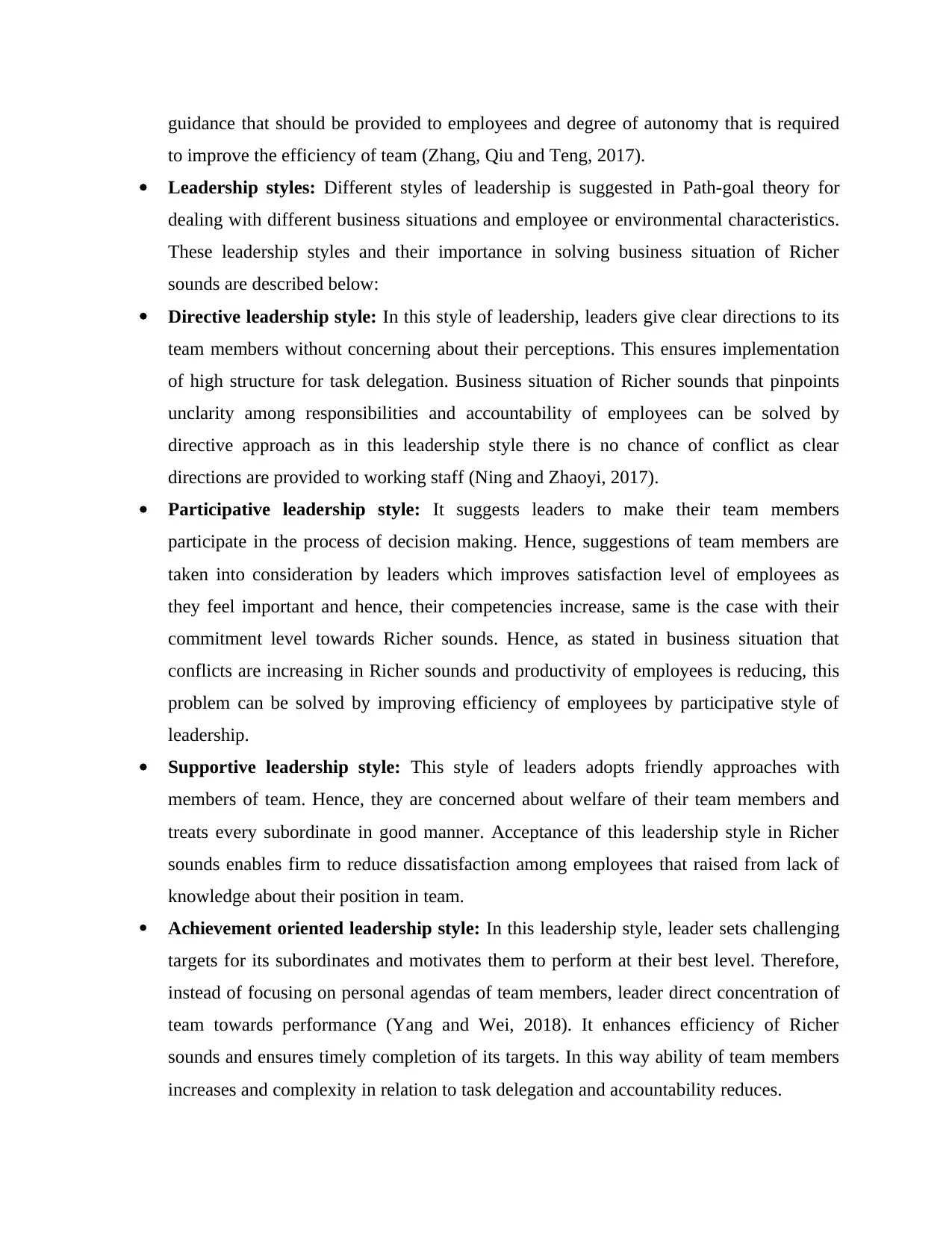
guidance that should be provided to employees and degree of autonomy that is required
to improve the efficiency of team (Zhang, Qiu and Teng, 2017).
Leadership styles: Different styles of leadership is suggested in Path-goal theory for
dealing with different business situations and employee or environmental characteristics.
These leadership styles and their importance in solving business situation of Richer
sounds are described below:
Directive leadership style: In this style of leadership, leaders give clear directions to its
team members without concerning about their perceptions. This ensures implementation
of high structure for task delegation. Business situation of Richer sounds that pinpoints
unclarity among responsibilities and accountability of employees can be solved by
directive approach as in this leadership style there is no chance of conflict as clear
directions are provided to working staff (Ning and Zhaoyi, 2017).
Participative leadership style: It suggests leaders to make their team members
participate in the process of decision making. Hence, suggestions of team members are
taken into consideration by leaders which improves satisfaction level of employees as
they feel important and hence, their competencies increase, same is the case with their
commitment level towards Richer sounds. Hence, as stated in business situation that
conflicts are increasing in Richer sounds and productivity of employees is reducing, this
problem can be solved by improving efficiency of employees by participative style of
leadership.
Supportive leadership style: This style of leaders adopts friendly approaches with
members of team. Hence, they are concerned about welfare of their team members and
treats every subordinate in good manner. Acceptance of this leadership style in Richer
sounds enables firm to reduce dissatisfaction among employees that raised from lack of
knowledge about their position in team.
Achievement oriented leadership style: In this leadership style, leader sets challenging
targets for its subordinates and motivates them to perform at their best level. Therefore,
instead of focusing on personal agendas of team members, leader direct concentration of
team towards performance (Yang and Wei, 2018). It enhances efficiency of Richer
sounds and ensures timely completion of its targets. In this way ability of team members
increases and complexity in relation to task delegation and accountability reduces.
to improve the efficiency of team (Zhang, Qiu and Teng, 2017).
Leadership styles: Different styles of leadership is suggested in Path-goal theory for
dealing with different business situations and employee or environmental characteristics.
These leadership styles and their importance in solving business situation of Richer
sounds are described below:
Directive leadership style: In this style of leadership, leaders give clear directions to its
team members without concerning about their perceptions. This ensures implementation
of high structure for task delegation. Business situation of Richer sounds that pinpoints
unclarity among responsibilities and accountability of employees can be solved by
directive approach as in this leadership style there is no chance of conflict as clear
directions are provided to working staff (Ning and Zhaoyi, 2017).
Participative leadership style: It suggests leaders to make their team members
participate in the process of decision making. Hence, suggestions of team members are
taken into consideration by leaders which improves satisfaction level of employees as
they feel important and hence, their competencies increase, same is the case with their
commitment level towards Richer sounds. Hence, as stated in business situation that
conflicts are increasing in Richer sounds and productivity of employees is reducing, this
problem can be solved by improving efficiency of employees by participative style of
leadership.
Supportive leadership style: This style of leaders adopts friendly approaches with
members of team. Hence, they are concerned about welfare of their team members and
treats every subordinate in good manner. Acceptance of this leadership style in Richer
sounds enables firm to reduce dissatisfaction among employees that raised from lack of
knowledge about their position in team.
Achievement oriented leadership style: In this leadership style, leader sets challenging
targets for its subordinates and motivates them to perform at their best level. Therefore,
instead of focusing on personal agendas of team members, leader direct concentration of
team towards performance (Yang and Wei, 2018). It enhances efficiency of Richer
sounds and ensures timely completion of its targets. In this way ability of team members
increases and complexity in relation to task delegation and accountability reduces.
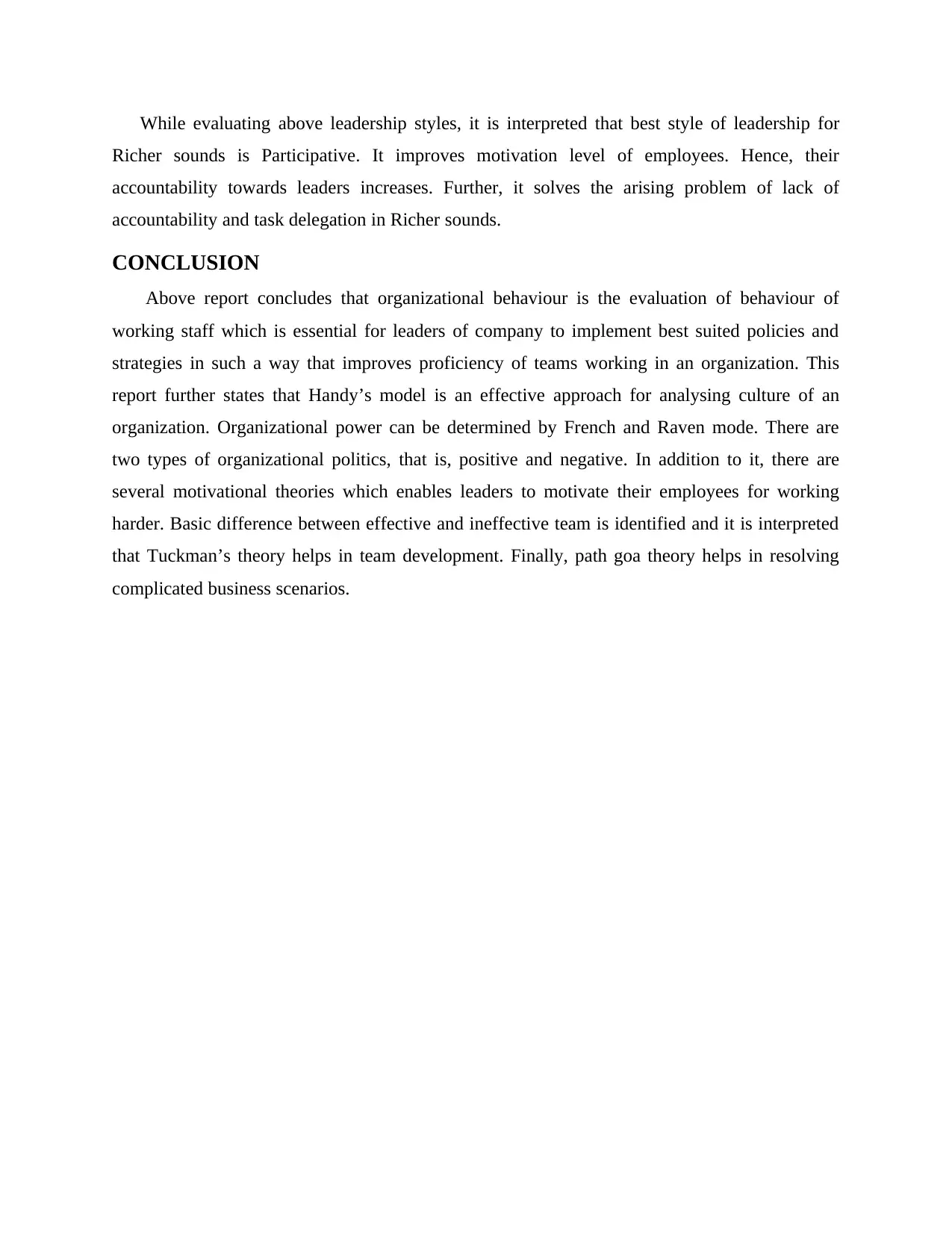
While evaluating above leadership styles, it is interpreted that best style of leadership for
Richer sounds is Participative. It improves motivation level of employees. Hence, their
accountability towards leaders increases. Further, it solves the arising problem of lack of
accountability and task delegation in Richer sounds.
CONCLUSION
Above report concludes that organizational behaviour is the evaluation of behaviour of
working staff which is essential for leaders of company to implement best suited policies and
strategies in such a way that improves proficiency of teams working in an organization. This
report further states that Handy’s model is an effective approach for analysing culture of an
organization. Organizational power can be determined by French and Raven mode. There are
two types of organizational politics, that is, positive and negative. In addition to it, there are
several motivational theories which enables leaders to motivate their employees for working
harder. Basic difference between effective and ineffective team is identified and it is interpreted
that Tuckman’s theory helps in team development. Finally, path goa theory helps in resolving
complicated business scenarios.
Richer sounds is Participative. It improves motivation level of employees. Hence, their
accountability towards leaders increases. Further, it solves the arising problem of lack of
accountability and task delegation in Richer sounds.
CONCLUSION
Above report concludes that organizational behaviour is the evaluation of behaviour of
working staff which is essential for leaders of company to implement best suited policies and
strategies in such a way that improves proficiency of teams working in an organization. This
report further states that Handy’s model is an effective approach for analysing culture of an
organization. Organizational power can be determined by French and Raven mode. There are
two types of organizational politics, that is, positive and negative. In addition to it, there are
several motivational theories which enables leaders to motivate their employees for working
harder. Basic difference between effective and ineffective team is identified and it is interpreted
that Tuckman’s theory helps in team development. Finally, path goa theory helps in resolving
complicated business scenarios.
⊘ This is a preview!⊘
Do you want full access?
Subscribe today to unlock all pages.

Trusted by 1+ million students worldwide
1 out of 14
Related Documents
Your All-in-One AI-Powered Toolkit for Academic Success.
+13062052269
info@desklib.com
Available 24*7 on WhatsApp / Email
![[object Object]](/_next/static/media/star-bottom.7253800d.svg)
Unlock your academic potential
Copyright © 2020–2026 A2Z Services. All Rights Reserved. Developed and managed by ZUCOL.




